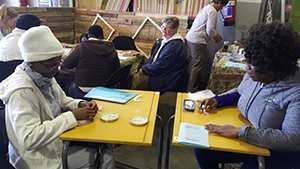Community Engagement Indaba a platform to engage Free State community stakeholders

Teaching women handicrafts for self-sustainability.
The University of the Free State (UFS), through the office of Community Engagement and in collaboration with Bloemshelter, has hosted the Community Engagement Indaba in Bloemfontein since 2013. This is a platform where stakeholders in business, welfare and other community organisations can network and hold dialogues that can bring about solutions to some of the societal challenges faced by Free State communities.
Bloemshelter is an independent and registered Non-Profit Organisation (NPO) and Public Benefit Organisation that provides shelter for the homeless; catering for women, women with children, the elderly, men and frail persons. The shelter accommodates up to 100 people in both the male and female shelters. The growing partnership it has with the UFS over recent years has grown its ability to reach out to local communities in a more effective way.
At the 2016 Community Engagement Indaba on 25-27 August, a number of stakeholders were invited to participate in the skills development action-learning workshops, under the theme: Unlocking Human Potential and Creating Jobs. This was a platform to strengthen the university’s partnerships with NPOs and other advocacy groups in the province. UFS academics, Community Service Learning students and community partners gave their presentations while the Director of Community Engagement, Bishop Billyboy Ramahlele, offered carpentry training. Among the participating collaborators was the Free State Department of Education, Celebrate Recovery, ABSA Bank, The Shunammite Foundation, Lebone Village, and Global University of Lifelong Learning (GULL).
Those who attended received certificates that will in future help them build a portfolio of learning evidence. The conference was about creating meaning, igniting learning, propelling movement, inspiring hope and encouraging sharing by bringing together students, academics and members of communities. The next Community Engagement Indaba will be held next year, on a date that will be announced early in the year.